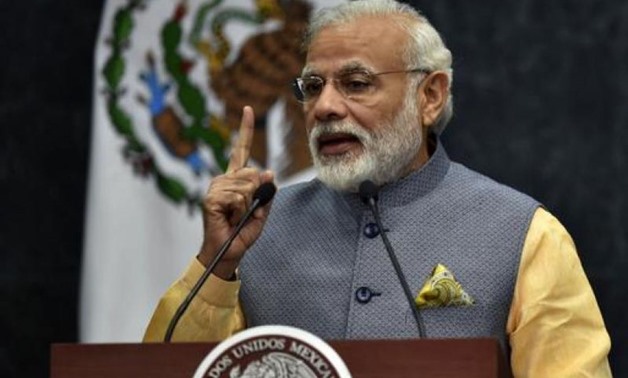
Prime Minister Narendra Modi held a special midnight session of parliament to launch the new goods and services tax (GST) which he called "good and simple". PHOTO: AFP
New Delhi - 1 July 2017:India on Saturday launched its biggest ever fiscal reform with the government promising a stronger, less corrupt economy while businesses are nervous about the new tax.
The goods and services tax (GST) replaces more than a dozen levies imposed nationally and by the 29 states. It aims to transform the nation of 1.3 billion people and its $2 trillion economy into a single market.
Prime Minister Narendra Modi held a special midnight session of parliament to launch GST which he called "a good and simple tax."
"With GST, the dream of one India, great India, will come true," the prime minister said.
"GST is a simple, transparent system which prevents generation of black money and curbs corruption," said Modi who jolted the country last year by withdrawing more than 85 percent of India's bank notes from circulation in a clampdown on under-the-table dealings.
"The system gives opportunity to honesty and people who do honest business."
But the prime minister, who has put huge efforts into the economy as he targets re-election in 2019, acknowledged that it would have teething problems.
Jammu and Kashmir state has refused to sign onto the one tax regime. And GST has sparked protests by traders, while the main opposition Congress Party boycotted the launch ceremony.
Businesses are nervous about the imposition of GST, which sets out four different rates of between five and 28 per cent instead of the one originally envisioned.
The GST rule book runs to more than 200 pages and last-minute changes were still being made late Friday.
Textile traders and other sectors went on strike ahead of the launch and many businesses say they are unclear about what to charge.
The Bhartiya Udyog Vyapar Mandal, a national traders association that claims 60 million members, called a one-day strike Friday to protest the GST.
Many are worried because while returns have to be filed by computer, they do not have or do not understand computers.
"Since August last year we have put forward our demands on GST but the government has never responded," national secretary general Vijay Prakash Jain told AFP. "We told the government, either fix this, or we will strike."
Most economists agree the reform -- first proposed in 2006 -- is long overdue, but warn the initial shock to the economy is likely to drag, rather than stoke growth, as businesses adjust.
Credit Suisse managing director Neelkanth Mishra warned that "the next few months will be a period of uncertainty in which no company would want to invest, that slows down the investment cycle and acts as a drag on the economy."
Rating agency ICRA said that while GST would lead to an increase in compliance in some sectors, it would also reduce the competitiveness of the informal businesses who are expected to lose out to the formal and organised players.
"Although it is still far from perfect, we realise how much better it is than the myriad taxes we've been subjected to over the last several decades," said Pratik Jain, Partner and Leader Indirect Tax, PwC India.
"The old India was economically fragmented. The new India will create one tax, one market for one nation," Finance Minister Arun Jaitley said.


Comments
Leave a Comment